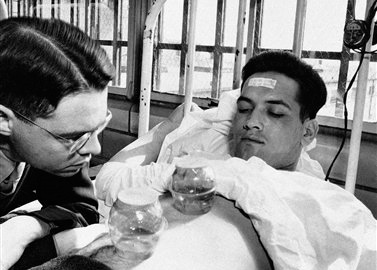U.S. government doctors intentionally infected prisoners in Guatemala with syphilis, disabled people in Connecticut with hepatitis and hospital patients in New York with cancer cells, according to a review of medical journal reports from the 1930s to the 1970s.

Reporters combed through decades of medical journals and discovered numerous accounts of unethical medical testing.
Associated Press reporters reviewed four decades of medical journals and found more than 40 studies that by modern standards would have been deemed unethical.
The news comes as a federal bioethics panel meets this week, spurred by a Guatemalan study that was discovered last fall.
The U.S. apologized for the study, in which prisoners and mental patients in Guatemala were infected with syphilis 65 years ago.
There have also been dozens of similar experiments in the United States in which doctors made healthy people sick in the hope of finding lifesaving treatments.
The studies violated the "first do no harm" medical principle that stretches back centuries.
"When you give somebody a disease – even by the standards of their time – you really cross the key ethical norm of the profession," Arthur Caplan, director of the University of Pennsylvania's Center for Bioethics, told the AP.
Tuskegee syphilis study is most famous
The most famous experiment that crossed ethical lines was the Tuskegee Syphilis study. In 1930, the U.S. Health Service launched an investigation of syphilis, a debilitating sexually transmitted disease. Ads were distributed throughout Macon County, Alabama, promising "special treatment" for men with "bad blood." The poor black population was so eager to receive free medical treatment that hundreds of men signed up.
In 1947, when the 'miracle drug' penicillin was discovered to effectively treat syphilis, doctors withheld it from the participants.
Although originally intended to last 6 six months, the study went on for 40 years and was kept secret from the public until 1972, when a former Health Service employee leaked the story to the press. President Bill Clinton issued a public apology on behalf of the American people in 1997, saying "what the United States Government did was shameful, and I am sorry."
Doctors experimented on people who did not have full rights
In the case of Guatemala, a small country in Central America, the experiments were worse in at least one way – — they intentionally infected healthy people with syphilis in order to study them.
Similar experiments at the time were not covered by news media, and those that were, just focused on the promise of discovering new cures.
In fact, many prominent researchers felt it was okay to experiment on people who did not have full rights in society – people like prisoners, mental patients, and poor people.
In one government study, doctors injected experimental flu vaccine into patients at a Michigan insane asylum and then exposed them to the flu virus. The study was co-written by Dr. Jonas Salk, the man who invented the polio vaccine 10 years later.
In another controversial study conducted at the Willowbrook State School for children with mental retardation, children were intentionally given hepatitis, a viral infection that affects the liver, in order to study the body's immune response.
Obama bioethics panel will set new rules for medical studies
It wasn't until the 1970s that several high-profile experiments sparked harsh criticism from the media and public disgust. The government responded with reforms and banned all research by drug companies and other outside agencies from federal prisons.
But, instead of ending such experiments, researchers turned to looked to other countries. In one study in Uganda, U.S.-funded doctors withheld AIDS drugs for some HIV-infected women even though it would have protected their newborns.
It's often hard to get information on international trials, but President Obama has asked his bioethics panel to look at the Guatemala example in order to come up with guidelines for all medical studies. The panel will report to the president in September and offer advice on how to tackle the ethical issues of past and future medical research.
–Compiled by Stella Clingmon for NewsHour Extra
No comments:
Post a Comment